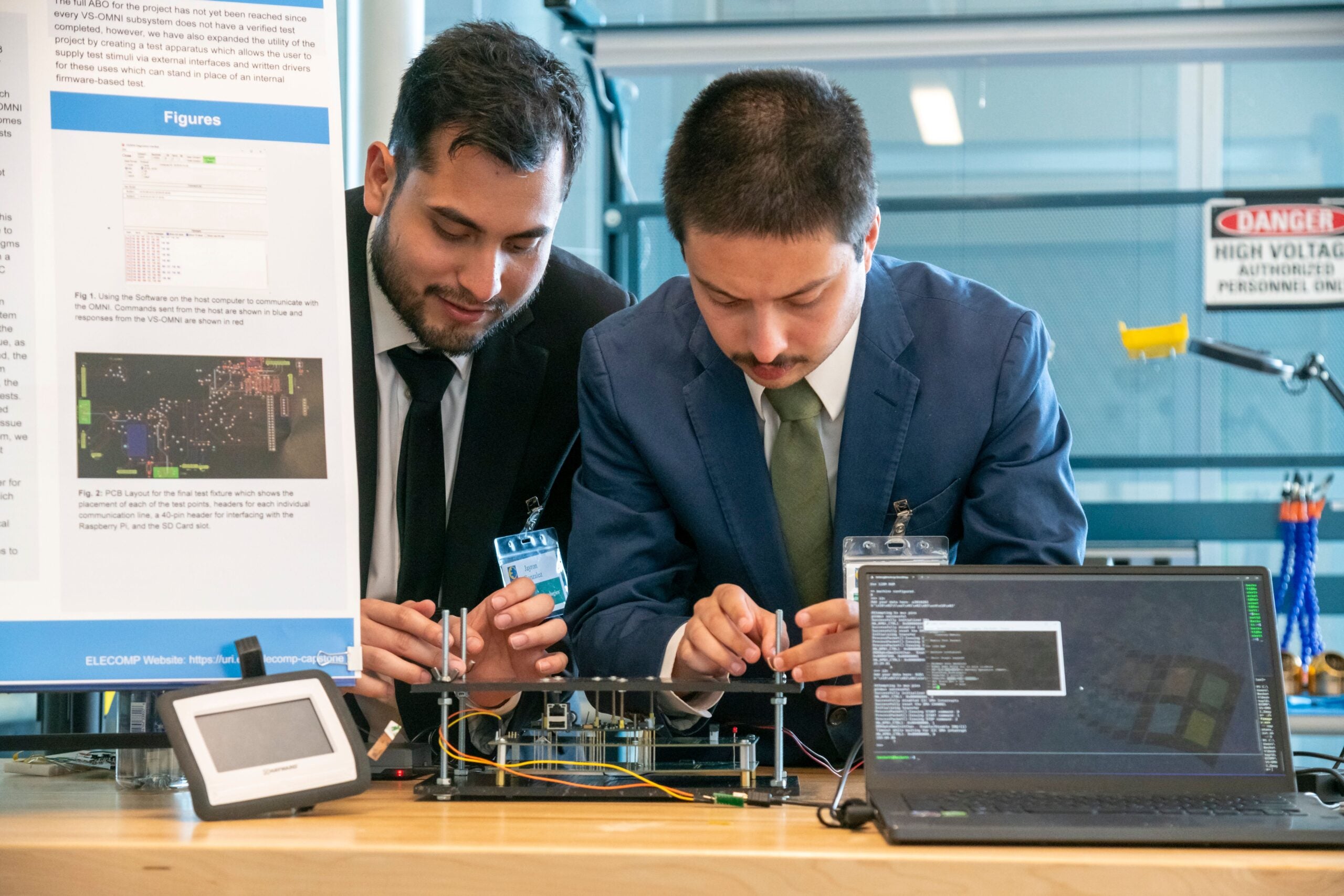These important guidelines are for sponsoring companies and their appointment of a Technical Director for a ELECOMP Capstone Design Team. Our electrical (ELE) and computer (COMP) engineering students, in their senior year, are very excited to work on real-world engineering problems with excellent corporate clients.

All electrical and computer engineering seniors in our department are required to work on a multi-disciplinary and team-oriented capstone design project, for 2 full semesters, over the academic year. This project will allow them to fully engage in the design process, teamwork and project management as well as use their problem-solving skills.
Key Roles in ELECOMP Capstone Design Program
Capstone Design Program Director
Professor Harish Sunak. He recruits corporate sponsored projects, and department faculty advisors on as-needed basis, assigns students to teams depending on their “passion statement,” and stewards the URI/corporate relationship. He also oversees all activities, including instruction, and also posts the final grades, after suitable feedback and evaluation scores from the Technical Director of the project.
ECBE Department Faculty Advisors
These advisors, approached on as-needed basis by the Program Director, provide their subject-matter expertise and knowledge specific to the project requirements. They provide guidance to the team as they execute their project. The onus is on the team to seek these advisors whenever needed. (ECBE stands for our department: Electrical, Computer & Biomedical Engineering)
Technical Director
An individual from the sponsoring company, who serves as the technical point of contact for the team, represents the company’s interests, directs the team as they work on the project, and facilitates technology transfer during the project. He provides the subject-matter expertise and is the point of contact for the project from the industry side.
The Technical Director also recruits other key subject-matter experts from within the company to further guide the team on specific key aspects of the project. These “associate” Technical Directors will acknowledge that time and support will be required, as determined by the Technical Director; this could be significant depending on the importance of the project and the phase of the project.
Importance of the Technical Director Role
The role of the Technical Director is extremely important in the learning process of our students and the success of the sponsored project. In order to help the his/her team achieve success, the Technical Director needs to:
- Mentor the team throughout the project, so that students can get a corporate experience.
- Mentor the students with new technology used in their company.
- Guide the team to meet benchmarks.
- Foster teamwork.
- Foster high quality communication and professionalism.
Expectations of the Technical Director
As a Technical Director, you can expect to spend an average of 3-5 hours per week working with your team and also for other support/emails to reports submitted by the team. This does vary, depending on the scope of the project and the number of students in the team, which can vary between 2 and 4 members.
Fridays, 2-5pm, is dedicated capstone project time for the teams to work with their Technical Directors, either on campus or at the company facility. Depending on the availability of the team members, other mutually convenient times during the week, can be arranged. Have in mind that each phase of a project may require more or less supervision than another; more will be required during October and November, at the start of the project.
Key Tasks
- Provide a clear description of the project, with expectations, goals and Best Outcome for the team.
- Present a 15-minute overview to all students on the 2nd Friday after the Fall Semester starts in early September. Students will contact the Technical Director to set up a kick-off meeting soon after the teams have been formed by the Program Director.
- Hold regular team meetings. During the course of the project, the Technical Director will meet regularly with the team. Weekly meetings, on Friday afternoon or other times, are required so that the project time lines are met.
- Regularly check the progress of the project. The Technical Director should monitor the progress of the project. Weekly Progress Reports (WPRs)Tuesday Progress Reports (TPSs) are submitted by the team every Sunday evening, starting in October of the Fall Semester.
- Maintain open communication with the Capstone Design Program Director.
- Provide guidance while writing reports and preparing oral presentations.
- Develop an effective team by engaging students to work effectively as a team.
- Participate in assessments by providing scores regarding the team performance and the written Report.
Tips for Success
- If possible, have successful and experienced Technical Directors give training to new Technical Directors.
- Communicate regularly with the team and, whenever necessary, with the Program Director.
- Be available throughout the project.
- Set clear and achievable goals; define the Best Outcome of the project and how this will benefit the company in the near term.
- Provide the students with tools necessary to succeed.
- Demand constant professionalism and high performance from the team.
- Be realistic of what a team of 2-5 students can accomplish.
- Scope expectations of the project to about 400-600 hours/team per semester.
- Recruit other key subject-matter experts from within the company to further guide the team on specific key aspects of the project.
